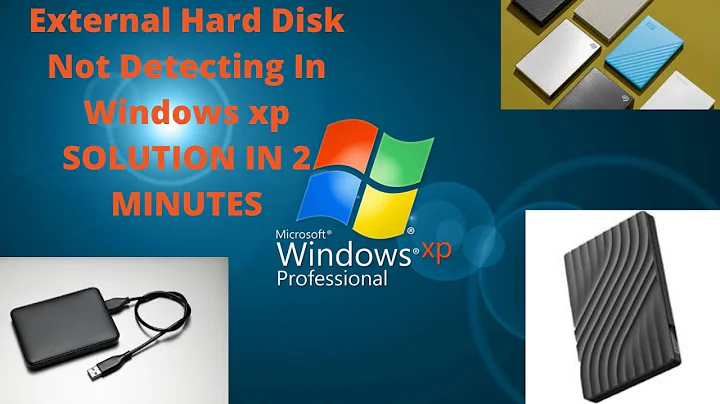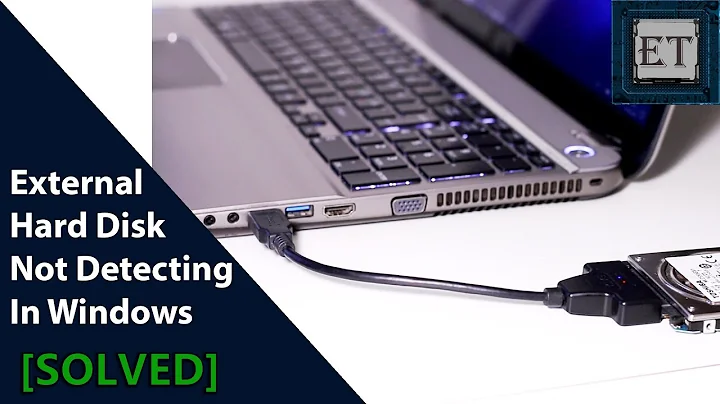External USB attached drive works in Windows XP but not in Windows 7. How to fix?
Solution 1
There is a firmware updater on that page you linked to for the product. Download the zip file and unzip it, read the word document in the "CobraNoMount - WR.rtfd" folder for troubleshooting instructions, and how to update the firmware.
http://www.ezq.com/docs/200929104804_CobraNoMount%20-%20WR.rtfd.zip
Solution 2
I had a simillar problem and after a quick search, came a cross a site that details numerous problems and solutions. One of which was that it could be a drive letter conflict, it seems my USB drive may have been trying to re-use a drive letter Windows had reserved for another device or network drive, I use virtual clone cd and mount and unmount regular. What I did was assign a drive letter Z in disk management (any letter high enough that windows would not assign) and it instantly uppeared in my computer.
Related videos on Youtube
user3784403
Hidden features of Stack Overflow? Stack Exchange blogs and podcasts Why is Internet access and Wi-Fi always so terrible at large tech conferences? Ubuntu manpage repository http://askubuntu.com/q/5121/how-do-i-report-a-bug http://askubuntu.com/q/14008/i-have-a-hardware-detection-problem-what-logs-do-i-need-to-look-into script (create a transcript of a terminal session) WiFi TroubleShooting Commands Ars Technica Climate change deniers billboard trolling porn, al-Qaeda, & steganography Google Tech Talks (search) WifiDocs: Wireless Networking Central How to check hardware specification in Linux If you have solved your problem you should answer your own question and then select ("check") it as the best answer. Answering your own question to complete it is perfectly acceptable, even encouraged (when a *better* answer is not available). See Jeff Atwood's [se] BLOG 01 July 2011 [*It’s OK to Ask and Answer Your Own Questions*](http://blog.stackoverflow.com/2011/07/its-ok-to-ask-and-answer-your-own-questions) or the end of this *[faq#question]* section. http://help.ubuntu.com/community/KnowThyUbuntu What is Trello ???
Updated on September 17, 2022Comments
-
user3784403 over 1 year
Earlier this week I purchased this "N52300 EZQuest Pro" external hard drive enclosure from here.
I can connect the enclosure using USB 2.0 and access the files in both NTFS partitions on the MBR partitioned drive when I use either Windows XP (SP3) or Mac OS X 10.6. So it works as expected in Windows XP and Mac OS X Snow Leopard.
However, the enclosure does not work in Windows 7 (Home Premium) either 64-bit or 32-bit or in Ubuntu 10.04 (kernel 2.6.32-23-generic).
I'm thinking this must be a Windows 7 driver problem because the enclosure works in Windows XP and Mac OS X Snow Leopard. I do know that no special drivers are required to use this enclosure. It is supported using the USB mass storage drivers included with Windows XP and Mac OS X. It should also work fine using the mass storage support in Windows 7, no?
FWIW, I have also tried using 32-bit Windows 7 on both my desktop, a Gigabyte GA-965P-DS3 with a Pentium Dual-Core E6500 @ 2.93 GHz, and on my early 2008 MacBook. I see the same failure in both cases that I see with 64-bit Windows 7. So it doesn't appear to be specific to one hardware platform.
I'm hoping someone out there can help me either get the enclosure to work in Windows 7 or convince me that the enclosure hardware is bad and should be RMAed. At the moment though an RMA seems pointless since this appears to be a (Windows 7) device driver problem.
I have tried to track down any updates to the mass storage drivers included with Windows 7 but have so far come up empty. Heck, I can't even figure out how to place a bug report with Microsoft since apparently the grace period for Windows 7 email support is only a few months.
I came across a link to some USB troubleshooting steps in another question. I haven't had a chance to look over the suggestions on that site or try them yet. Maybe tomorrow if I have time ... ;-)
I'll finish up with some more details about the problem.
When I connect the enclosure using USB to Windows 7 at first it appears everything worked. Windows detects the drive and installs a driver for it. Looking in
Device Managerthere is an entry under theHard Drivessection with the title,Hitachi HDT721010SLA360 USB Device.When you open Windows
Disk Managementthe first time after the enclosure has been attached the drive appears as "Not initialize" and I'm prompted to initialize it. This is bogus. After all, the drive worked fine in Windows XP, so I know it has already been initialized, partitioned, and formatted. So of course I never try to initialize it "again". (It's a 1 GB drive, and I don't want to lose the data on it).Except for this first time, the drive never shows up in Disk Management again unless I uninstall the
Hitachi HDT721010SLA360 USB Deviceentry underHard Drives, unplug, and then replug the enclosure. If I do that then the process in the previous paragraph repeats.In Ubuntu, the enclosure never shows up at all at the file system level.
Below are an excerpt from
kern.logand an excerpt from the result oflsusb -vafter attaching the enclosure. It appears that Ubuntu at first recongnizes the enclosure and is attempting to attach it, but encounters errors which prevent it from doing so. Unfortunately, I don't know whether any of this info is useful or not.Excerpt from
kern.log[ 2684.240015] usb 1-2: new high speed USB device using ehci_hcd and address 22 [ 2684.393618] usb 1-2: configuration #1 chosen from 1 choice [ 2684.395399] scsi17 : SCSI emulation for USB Mass Storage devices [ 2684.395570] usb-storage: device found at 22 [ 2684.395572] usb-storage: waiting for device to settle before scanning [ 2689.390412] usb-storage: device scan complete [ 2689.390894] scsi 17:0:0:0: Direct-Access Hitachi HDT721010SLA360 ST6O PQ: 0 ANSI: 4 [ 2689.392237] sd 17:0:0:0: Attached scsi generic sg7 type 0 [ 2689.395269] sd 17:0:0:0: [sde] 1953525168 512-byte logical blocks: (1.00 TB/931 GiB) [ 2689.395632] sd 17:0:0:0: [sde] Write Protect is off [ 2689.395636] sd 17:0:0:0: [sde] Mode Sense: 11 00 00 00 [ 2689.395639] sd 17:0:0:0: [sde] Assuming drive cache: write through [ 2689.412003] sd 17:0:0:0: [sde] Assuming drive cache: write through [ 2689.412009] sde: sde1 sde2 [ 2689.455759] sd 17:0:0:0: [sde] Assuming drive cache: write through [ 2689.455765] sd 17:0:0:0: [sde] Attached SCSI disk [ 2692.620017] usb 1-2: reset high speed USB device using ehci_hcd and address 22 [ 2707.740014] usb 1-2: device descriptor read/64, error -110 [ 2722.970103] usb 1-2: device descriptor read/64, error -110 [ 2723.200027] usb 1-2: reset high speed USB device using ehci_hcd and address 22 [ 2738.320019] usb 1-2: device descriptor read/64, error -110 [ 2753.550024] usb 1-2: device descriptor read/64, error -110 [ 2753.780020] usb 1-2: reset high speed USB device using ehci_hcd and address 22 [ 2758.810147] usb 1-2: device descriptor read/8, error -110 [ 2763.940142] usb 1-2: device descriptor read/8, error -110 [ 2764.170014] usb 1-2: reset high speed USB device using ehci_hcd and address 22 [ 2769.200141] usb 1-2: device descriptor read/8, error -110 [ 2774.330137] usb 1-2: device descriptor read/8, error -110 [ 2774.440069] usb 1-2: USB disconnect, address 22 [ 2774.440503] sd 17:0:0:0: Device offlined - not ready after error recovery [ 2774.590023] usb 1-2: new high speed USB device using ehci_hcd and address 23 [ 2789.710020] usb 1-2: device descriptor read/64, error -110 [ 2804.940020] usb 1-2: device descriptor read/64, error -110 [ 2805.170026] usb 1-2: new high speed USB device using ehci_hcd and address 24 [ 2820.290019] usb 1-2: device descriptor read/64, error -110 [ 2835.520027] usb 1-2: device descriptor read/64, error -110 [ 2835.750018] usb 1-2: new high speed USB device using ehci_hcd and address 25 [ 2840.780085] usb 1-2: device descriptor read/8, error -110 [ 2845.910079] usb 1-2: device descriptor read/8, error -110 [ 2846.140023] usb 1-2: new high speed USB device using ehci_hcd and address 26 [ 2851.170112] usb 1-2: device descriptor read/8, error -110 [ 2856.300077] usb 1-2: device descriptor read/8, error -110 [ 2856.410027] hub 1-0:1.0: unable to enumerate USB device on port 2 [ 2856.730033] usb 3-2: new full speed USB device using uhci_hcd and address 11 [ 2871.850017] usb 3-2: device descriptor read/64, error -110 [ 2887.080014] usb 3-2: device descriptor read/64, error -110 [ 2887.310011] usb 3-2: new full speed USB device using uhci_hcd and address 12 [ 2902.430021] usb 3-2: device descriptor read/64, error -110 [ 2917.660013] usb 3-2: device descriptor read/64, error -110 [ 2917.890016] usb 3-2: new full speed USB device using uhci_hcd and address 13 [ 2922.911623] usb 3-2: device descriptor read/8, error -110 [ 2928.051753] usb 3-2: device descriptor read/8, error -110 [ 2928.280013] usb 3-2: new full speed USB device using uhci_hcd and address 14 [ 2933.301876] usb 3-2: device descriptor read/8, error -110 [ 2938.431993] usb 3-2: device descriptor read/8, error -110 [ 2938.540073] hub 3-0:1.0: unable to enumerate USB device on port 2Excerpt from
lsusb -vBus 001 Device 017: ID 0dc4:0000 Macpower Peripherals, Ltd Device Descriptor: bLength 18 bDescriptorType 1 bcdUSB 2.00 bDeviceClass 0 (Defined at Interface level) bDeviceSubClass 0 bDeviceProtocol 0 bMaxPacketSize0 64 idVendor 0x0dc4 Macpower Peripherals, Ltd idProduct 0x0000 bcdDevice 0.01 iManufacturer 1 EZ QUEST iProduct 2 USB Mass Storage iSerial 3 220417 bNumConfigurations 1 Configuration Descriptor: bLength 9 bDescriptorType 2 wTotalLength 32 bNumInterfaces 1 bConfigurationValue 1 iConfiguration 5 Config0 bmAttributes 0xc0 Self Powered MaxPower 0mA Interface Descriptor: bLength 9 bDescriptorType 4 bInterfaceNumber 0 bAlternateSetting 0 bNumEndpoints 2 bInterfaceClass 8 Mass Storage bInterfaceSubClass 6 SCSI bInterfaceProtocol 80 Bulk (Zip) iInterface 4 Interface0 Endpoint Descriptor: bLength 7 bDescriptorType 5 bEndpointAddress 0x01 EP 1 OUT bmAttributes 2 Transfer Type Bulk Synch Type None Usage Type Data wMaxPacketSize 0x0200 1x 512 bytes bInterval 0 Endpoint Descriptor: bLength 7 bDescriptorType 5 bEndpointAddress 0x81 EP 1 IN bmAttributes 2 Transfer Type Bulk Synch Type None Usage Type Data wMaxPacketSize 0x0200 1x 512 bytes bInterval 0 Device Qualifier (for other device speed): bLength 10 bDescriptorType 6 bcdUSB 2.00 bDeviceClass 0 (Defined at Interface level) bDeviceSubClass 0 bDeviceProtocol 0 bMaxPacketSize0 64 bNumConfigurations 1 Device Status: 0x0001 Self Powered
Update: Results using Firewire to connect.
Today, I received a 1394b 9-pin to 1394a 6-pin cable which allowed me to connect the "EZQuest Pro" via Firewire. Everything works.
When I use Firewire I can connect whether I'm using Windows 7 or Ubuntu 10.04. I even tried booting my Gigabyte desktop as an Mac OS X 10.6.3 Hackintosh, and it worked there as well. (Though if I recall correctly, it also worked when using USB 2.0 and booting Mac OS X on the desktop. Certainly it works with USB 2.0 and my MacBook.)
I believe the firmware on the device is at the latest level available, v1.07. I base this on the excerpt below from the Mac OS X
System Profilerwhich showsFirmware Revision: 0x107.Bottom line: It's nice that the enclosure is actually usable when I connect with Firewire. But I am still searching for an answer as to why it does not work correctly when using USB 2.0 in Windows 7 (and Ubuntu ... but really Windows 7 is my biggest concern).
OXFORD IDE Device 1: Manufacturer: EZ QUEST Model: 0x0 GUID: 0x1D202E0220417 Maximum Speed: Up to 800 Mb/sec Connection Speed: Up to 400 Mb/sec Sub-units: OXFORD IDE Device 1 Unit: Unit Software Version: 0x10483 Unit Spec ID: 0x609E Firmware Revision: 0x107 Product Revision Level: ST6O Sub-units: OXFORD IDE Device 1 SBP-LUN: Capacity: 1 TB (1,000,204,886,016 bytes) Removable Media: Yes BSD Name: disk3 Partition Map Type: MBR (Master Boot Record) S.M.A.R.T. status: Not Supported-
ganesh over 10 yearsFrom your logs: 1)
[sde] 1953525168 512-byte logical blocks:is SDE a 512 sector drive, or a 4K sector drive? (Sometimes funny things happen with 4K AF drives when an USB bridge tries to present them in an ancient way). 2)usb 1-2: device descriptor read/64, error -110That does not sound good either. It might work, but something is wrong. And that something might well be a not fully USB compliant USB to SATA bridge. (In other words, try a different enclosure). -
user3784403 over 10 years@Hennes While my memory is admittedly foggy about this, looking through my question above it appears I was testing with a 1TB Hitachi HDT721010SLA360 which is a 512 sector SATA drive. Of course, the N52300 EZQuest Pro is a PATA enclosure, so I would also have been using a SATA to PATA adapter. (OWC included the adapter when I purchased the enclosure.) I keep intending to revisit this, but I keep getting distracted. <sigh/>
-
-
 Moab almost 14 yearsI think you better stick with firewire on the flash upgrade. Let us know how it goes.
Moab almost 14 yearsI think you better stick with firewire on the flash upgrade. Let us know how it goes.
![USB Device Not Recognized Error In Windows 7 FIX [Tutorial]](https://i.ytimg.com/vi/eNpwfSasRn0/hqdefault.jpg?sqp=-oaymwEcCOADEI4CSFXyq4qpAw4IARUAAIhCGAFwAcABBg==&rs=AOn4CLBONE4paihnoj_G24KX3qKGokzx9g)



